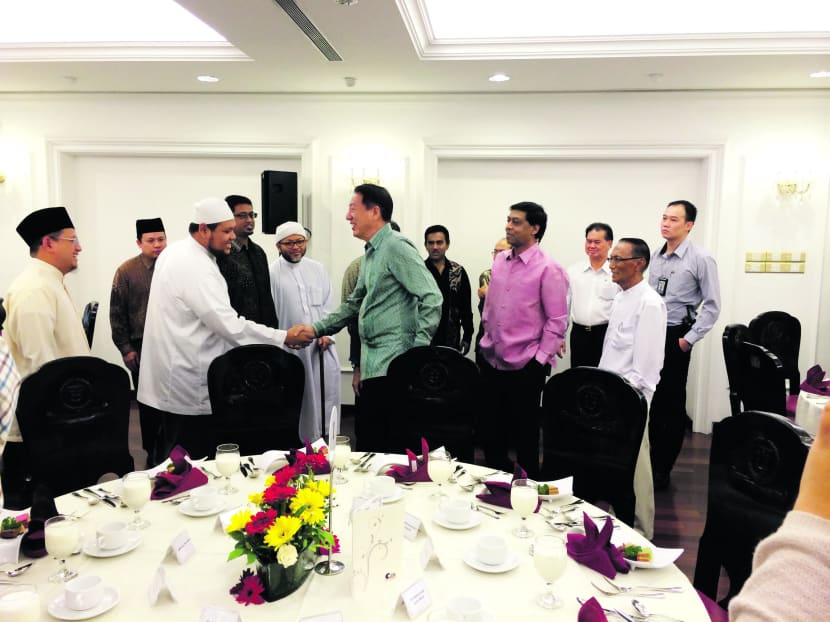Syrian conflict could pose bigger risk to S’pore than JI: DPM Teo
SINGAPORE — The Syrian conflict could pose a bigger risk to Singapore than the Jemaah Islamiyah (JI) terrorist network did in 2001, said Deputy Prime Minister Teo Chee Hean yesterday, a day after he had announced in Parliament that a handful of Singapore citizens had gone to participate in the conflict there.

Deputy Prime Minister Teo Chee Hean and about 60 religious leaders of various faiths were at the discussion.
PHOTO: NEO CHAI CHIN
SINGAPORE — The Syrian conflict could pose a bigger risk to Singapore than the Jemaah Islamiyah (JI) terrorist network did in 2001, said Deputy Prime Minister Teo Chee Hean yesterday, a day after he had announced in Parliament that a handful of Singapore citizens had gone to participate in the conflict there.
“I’d say the potential is there for a variety of reasons,” Mr Teo told reporters after a closed-door discussion with about 60 religious leaders of various faiths on the Syrian conflict, its potential impact on Singapore and what the community can do to maintain social harmony.
He cited the convenience of air travel, the extent of violence in Syria causing emotions to run high and the rapid spread of radical ideology due to the Internet as reasons.
Syria is in its third year of strife after the government cracked down on peaceful protests and the Middle Eastern country descended into civil war between the regime of President Bashar Assad and rebels. More than three million Syrians have become refugees in countries such as Turkey, Lebanon and Jordan.
Mr Teo, who is also Home Affairs Minister, had said in Parliament on Wednesday that the number of foreigners who might have joined the fighting in Syria has exceeded the number of foreign fighters in the Soviet-Afghan war in the 1980s. Among the Singaporeans who have joined the conflict is Haja Fakkurudeen Usman Ali, a naturalised citizen, who has taken his wife and three children to Syria. A woman is also believed to have gone there with her foreign husband and two teenage children.
Mr Teo said the discussion with religious leaders was very useful, with the two concerns being security and social harmony.
“While there may be individuals who have become radicalised or who have taken up extreme positions, we need to understand that in Singapore, all our communities believe in peace and harmony,” he said.
Various efforts have been taken by the Muslim community here to prevent radicalisation — through Friday sermons at mosques and religious classes by the Islamic Religious Council of Singapore, providing Muslims here with channels to donate to humanitarian purposes, and media and cyber-wellness programmes, said Dr Yaacob Ibrahim, Minister-in-charge of Muslim Affairs.
Friday sermons “have started really talking about the Syrian conflict and how Muslims who feel (for) the conflict can respond”, he said. “We’re looking into cyber-wellness programmes because we understand the Internet is a game changer now, compared with the (time of the) JI incident.”
Mr Mohamed Nassir Abdul Sukkur of Islamic education outfit SimplyIslam, who attended the discussion, said the threat of extremist ideas being spread to Singapore was serious, with “wayward individuals” trying to get Muslims and non-Muslims involved in the war or religious teachers spreading “extreme narratives” about needing to go for jihad (holy war) to fulfil their Muslim duty.
Moderate and sensible voices must prevail, said Mr Mohamed Nassir, who expressed shock that women and children could be involved in the conflict. “They’re not supposed to be involved at all ... it’s not in the teachings of Islam in whatever denomination they come from.”
SimplyIslam and other organisations are raising funds to help refugees and building a school for them in Turkey, he said.
The Syrian conflict is a challenge to “Singapore as a whole” because the nation will be affected if Singaporeans return after participating in the conflict, said Dr Yaacob. Non-Muslim leaders can also help correct misconceptions that tarnish the Muslim community, he added.
Bishop Wee Boon Hup of the Methodist Church of Singapore and president of National Council of Churches of Singapore, who also attended the discussion, said community leaders can assure non-Muslims that Muslim leaders are “getting hold of the problem”. “I think they are to be commended for facing the challenges head-on,” he said.






